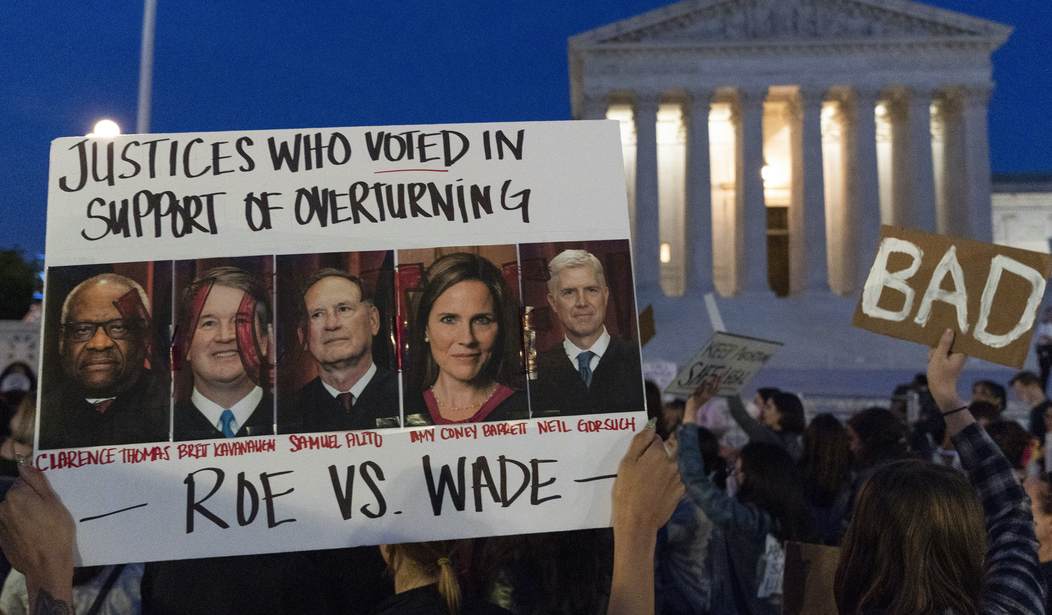Yes, it’s not just “especially problematic,” as the Washington Post editorial board wrote Monday afternoon, although it is that as well. It’s actually illegal, as we have noted a number of times, thanks to 18 USC 1507, a federal criminal statute that makes protests targeting residences of federal judges a crime punishable by up to a year in jail.
The Post’s Aaron Blake asked some legal experts about the law and its use, and got assurances that 18 USC 1507 is not just real, but it’s also constitutional:
But while protest is indeed ingrained in American democracy, legally speaking the comparison between protesting a politician at home and a member of the judiciary at home is inexact. And experts say the latter category of protests is likely illegal regardless of how peaceful the demonstrations are. …
Tabatha Abu El-Haj, an expert on protest rights at Drexel University’s law school, said that the current protests at justices’ homes qualify under the statute and that the statute, if tested, would likely be found constitutional.
“The statute would seem to apply both because … they appear to be picketing and parading with the relevant intent and at the relevant locations,” Abu El-Haj said, “but also because the statute has a catch-all ‘resorts to any other demonstration in or near any such building or residence.’ ”
Actually, these kinds of restrictions on protests targeting judges have already been upheld and act as precedent. Aaron reviews a couple of cases, including Frisby v. Schultz (1988), which upheld a local ordinance in Wisconsin against targeting any residence with a political demonstration. Cox v. Louisiana (1965) is even more on point, ruling that a narrowly drawn law protecting judges during deliberations does not violate the First Amendment — even when the demonstration takes place elsewhere:
That case didn’t deal specifically with banning protests outside the home of a judge or another party to a legal proceeding — but it did uphold a law that would seem to involve less potentially problematic efforts to influence them. And the court has repeatedly suggested protests of legal proceedings should be considered differently, since protests could possibly impact nonpolitical proceedings or even inject merely the appearance of political influence or intimidation into decisions that should be based solely on the law, not public opinion.
“There is no room at any stage of judicial proceedings for such intervention; mob law is the very antithesis of due process,” the justices wrote in Cox.
Interestingly, as Twitter follower Verbaluce points out, that would technically make such protests at the Supreme Court itself potentially illegal … but only if Congress rewrote 18 USC 1507. As it stands now, it’s more a little more narrowly tailored than the law in Cox was, but perhaps could stretch with the passage I have bolded here:
Whoever, with the intent of interfering with, obstructing, or impeding the administration of justice, or with the intent of influencing any judge, juror, witness, or court officer, in the discharge of his duty, pickets or parades in or near a building housing a court of the United States, or in or near a building or residence occupied or used by such judge, juror, witness, or court officer, or with such intent uses any sound-truck or similar device or resorts to any other demonstration in or near any such building or residence, shall be fined under this title or imprisoned not more than one year, or both.
I doubt that would apply to courthouses themselves. This looks more intended to private offices such as law offices, or for jurors and witnesses, places of employment. An attempt to stretch that to the courthouses would likely get slapped down on appeal given the long tradition of allowing such protests at the Supreme Court building itself. The otherwise narrow tailoring of 18 USC 1507 makes it that much stronger to enforce and uphold, too.
But short of that, one could expect courts to uphold prosecutions of the protesters, if Merrick Garland decides to start doing his job and enforcing this law. That may be especially true after watching this intimidation campaign target justices in an attempt to corrupt the judicial deliberation process. The Left’s masks keep dropping and demonstrating the mob-rule fascism that our constitutional order is designed to prevent. Time to hold them accountable.
Update: The link to the Cox decision went to the wrong case. I’ve fixed it now, thanks to Gregory Sturges,








Join the conversation as a VIP Member